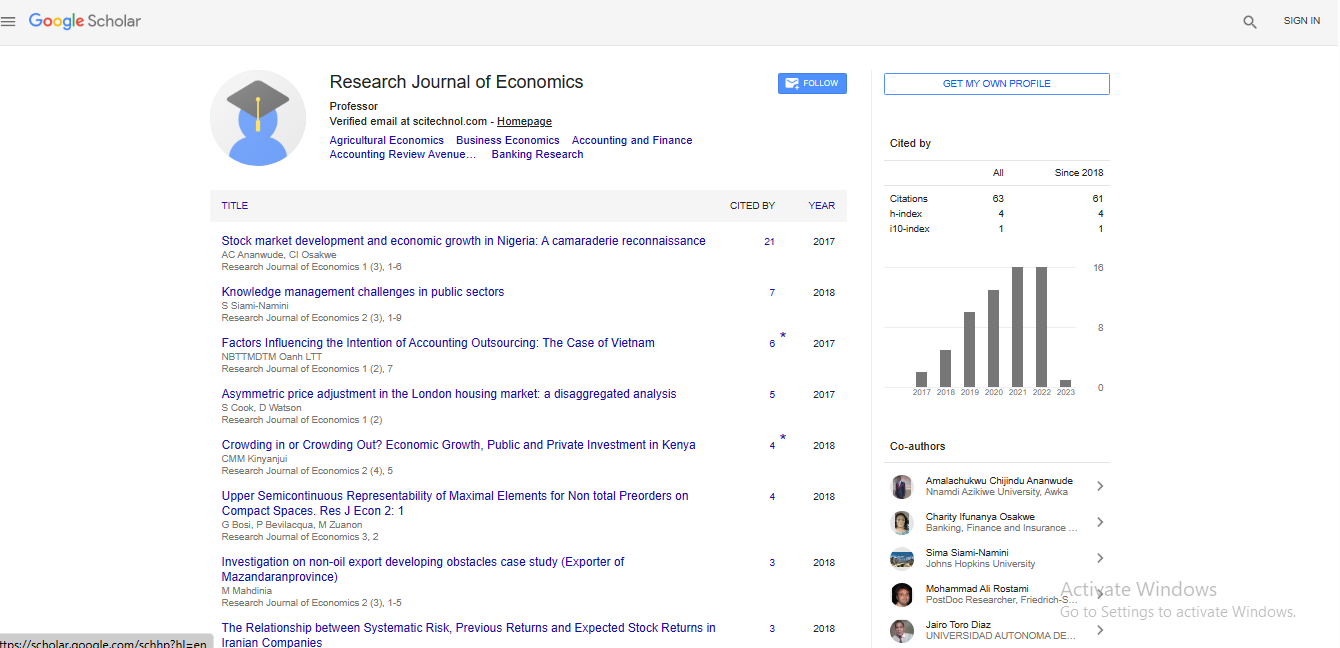Short Communication, Res J Econ Vol: 7 Issue: 1
Economic Diplomacy in the Face of Currency Crises: Strategies for Mitigating Trade and Investment Disruptions
Sarah Aslam*
Department of Management Sciences, COMSATS University, Islamabad, Attock Campus, Pakistan
*Corresponding Author: Sarah Aslam
Department of Management Sciences,
COMSATS University, Islamabad, Attock Campus, Pakistan
Tel: +453256875656
E-mail: asarah818@yahoo.com
Received date: 07 January, 2023, Manuscript No. RJE-23-89863;
Editor assigned date: 10 January, 2023, PreQC No. RJE-23-89863 (PQ);
Reviewed date: 24 January, 2023, QC No. RJE-23-89863;
Revised date: 31 January, 2023, Manuscript No. RJE-23-89863 (R);
Published date: 07 February, 2023, DOI: 10.4172/RJE.1000129
Citation: Aslam S (2023) Economic Diplomacy in the Face of Currency Crises: Strategies for Mitigating Trade and Investment Disruptions. Res J Econ. 7:1
Description
A currency crisis occurs when a country experiences a sudden and sharp depreciation in the value of its currency, often leading to financial instability and economic distress. This can occur for a variety of reasons, including high levels of debt, trade imbalances, political instability, or speculative attacks by investors [1].
During a currency crisis, the value of a country's currency can plummet rapidly, leading to inflation, capital flight, and a loss of confidence in the economy [2]. This can have severe consequences, including higher prices for imported goods, reduced purchasing power for citizens, and a reduction in foreign investment and trade.
Governments and central banks typically respond to currency crises by taking measures to stabilize the currency, such as raising interest rates, selling foreign reserves, or implementing austerity measures. However, these measures can often be painful for citizens and can exacerbate economic problems in the short term [3].
Benefits of currency crisis
Increased competitiveness: A currency crisis can lead to depreciation in a country's currency, making its exports more competitive in international markets. This can help to boost the country's export earnings, which can have a positive impact on its economy in the long term.
Increased investment opportunities: A currency crisis can make assets in the affected country more affordable for foreign investors, which can create investment opportunities and stimulate economic growth.
Structural reforms: In response to a currency crisis, governments and central banks may implement structural reforms aimed at improving the country's economic fundamentals, such as reducing debt levels, improving trade balances, or increasing transparency and accountability. These reforms can help to strengthen the country's economy and promote long-term growth.
Improved governance: A currency crisis can also serve as a wakeup call for governments and central banks to improve their governance and decision-making processes. This can lead to greater accountability and transparency in economic policymaking, which can help to prevent future crises [1].
Limitations of currency crisis
Limited scope: Currency crises typically only affect the country experiencing the crisis and may not have a significant impact on the global economy. However, if the country is a major trading partner for other countries, it could affect the global economy through trade disruptions.
Short-term impact: Currency crises can have a severe impact on the country's economy in the short term, but they usually do not have long-term effects. A country can recover from a currency crisis if it implements appropriate policy measures, such as structural reforms, fiscal discipline, and monetary policy adjustments [2].
Limited effect on developed economies: Currency crises are more likely to occur in developing or emerging economies that are vulnerable to external shocks, such as changes in global commodity prices, capital outflows, and changes in investor sentiment. In contrast, developed economies with stable currencies and strong institutions are less likely to experience a currency crisis.
Limited effect on global currencies: While a currency crisis can weaken a country's currency, it usually does not have a significant impact on global currencies, such as the US dollar, euro, or yen. Global currencies are backed by strong economies and institutions, and their value is determined by a complex range of factors, not just one country's currency crisis [4].
Conclusion
Currency crises can have far-reaching and severe consequences for both developed and developing economies. These crises can be triggered by a range of factors, including macroeconomic imbalances, political instability, and external shocks. When a currency crisis occurs, it can lead to economic instability, inflation, and trade disruptions, among other negative consequences. International trade can act as a transmission mechanism for currency crises, with exchange rate fluctuations impacting trade flows and the prices of imported and exported goods.
References
- Greco TH (2009) The end of money and the future of civilization.
- Roodman D (2009) A note on the theme of too many instruments. Oxf Bull Econ Stat 71: 135-158.
- Agrippino SM, Rey H (2020) U.S. Monetary policy and the global financial cycle. Rev Econ Stud 87: 2754-2776.
- Grabow K (2016) PEGIDA and the alternative für Deutschland: two sides of the same coin? Eur View 15: 173-181.
 Spanish
Spanish  Chinese
Chinese  Russian
Russian  German
German  French
French  Japanese
Japanese  Portuguese
Portuguese  Hindi
Hindi 